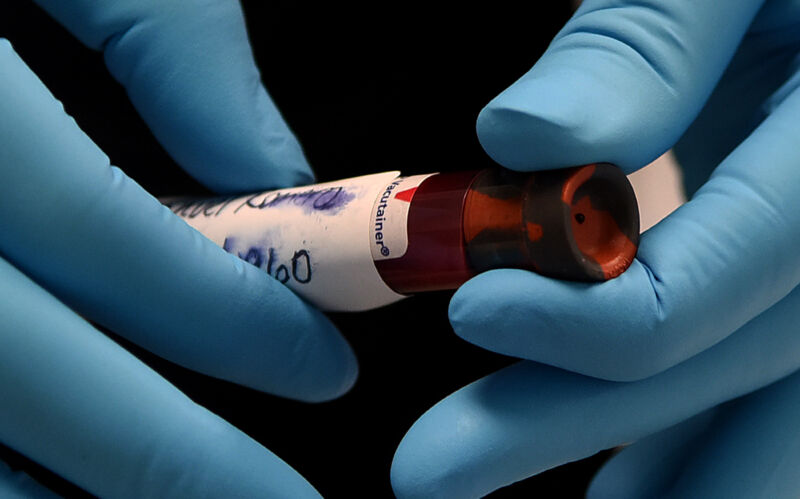crackdown —
Regulatory “flexibility” was never meant to allow fraud, agency says.
Beth Mole
–



Enlarge / MAY 4, 2020: A health worker handles a blood sample on the first day of a free COVID-19 antibody testing event.
After a gush of bogus coronavirus blood tests, the US Food and Drug Administration announced Monday that test makers must submit data within 10 days showing that their tests actually work—or risk getting purged from the market.
The new requirement updates a lax policy the FDA announced March 16, which prioritized providing “regulatory flexibility” to allow these blood tests—aka serology tests—to hit the market quickly during the pandemic. That flexibility came at the expense of normal scientific vetting that ensures those tests meet standards for accuracy and reliability.
“In mid-March, it was critical for the FDA to provide regulatory flexibility for serology test developers, given the nature of this public health emergency… However, flexibility never meant we would allow fraud,” the FDA wrote in a policy update Monday. “We unfortunately see unscrupulous actors marketing fraudulent test kits and using the pandemic as an opportunity to take advantage of Americans’ anxiety.”
The serology tests are intended to detect antibodies against the new coronavirus, SARS-CoV-2. Antibodies are Y-shaped proteins that can circulate in the blood to recognize specific germs that the immune system has previously fought off. Antibodies generally do this by homing in on signature features of a germ, such as the spiky proteins that jut out of the SARS-CoV-2. If the germ shows up again, those antibodies—made by specialized immune cells—can quickly recognize the invader and trigger an immune response to try to prevent reinfection.
Thus, the presence of antibodies in a person’s blood only tells if the immune system has encountered the germ in the past—it’s not used to diagnose new cases of COVID-19, the disease caused by SARS-CoV-2. There are separate diagnostic tests for that, which generally work by detecting genetic material from the virus itself.
Testing people for past infections is mainly helpful on a population level. It can help public health researchers to understand how far the virus has spread, what proportion of infected people have asymptomatic or extremely mild cases, and the disease’s true fatality rate (which is generally calculated by the number of deaths among the number of infected people who recover.)
Testing limits
For better-understood diseases, antibody tests can also help determine if a person is likely to be immune to reinfection. That is, for some diseases, our immune systems can make brawny antibodies that can completely prevent reinfection. So, if a person tests positive for antibodies to a specific germ, that may mean they’re protected against that disease. But not all antibodies are so protective. They can also be weak or wane over time—potentially within months. For now, we don’t know enough about our own immune responses to SARS-CoV-2 to know if antibodies against the virus are protective and, if so, for how long. That means, if someone tests positive for SARS-CoV-2 antibodies, they may still be able to get COVID-19.
As such, for now, SARS-CoV-2 antibody testing is largely an academic endeavor—to try to understand spread, asymptomatic cases, and fatality rate. It is not yet for determining a person’s immunity, and it is certainly not diagnosing new cases. For these reasons, the FDA in March thought it would be safe to loosen oversight of serology testing during the pandemic.
But since then, the market has been flooded with shoddy tests and bogus claims. “Some test developers have falsely claimed their serological tests are FDA approved or authorized. Others have falsely claimed that their tests can diagnose COVID-19 or that they are for at-home testing,” the FDA said. The agency also noted that “a concerning number of commercial serology tests are being promoted inappropriately, including for diagnostic use, or are performing poorly based on an independent evaluation by the [National Instituted of Health].”
The FDA said it has so far authorized just 12 tests, but reviews for over 200 others are in the works.
Now, test makers must start submitting data to the FDA, and the agency has set “specific performance threshold recommendations” on how many false positive and false negatives are acceptable from any test. The agency said it will “continue to take steps to appropriately balance assurances that an antibody test is accurate and reliable with timely access to such tests.”

